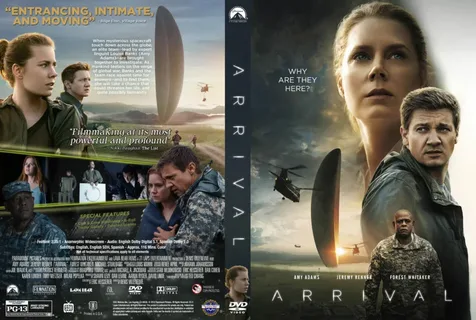- Explore our comprehensive overview of “Arrival,” the acclaimed 2016 sci-fi film directed by Denis Villeneuve. Discover the film’s history, cast roles, key features, and frequently asked questions about this thought-provoking and visually stunning movie.
Table of Contents
“Arrival” is a 2016 science fiction film directed by Denis Villeneuve, known for its unique take on the alien invasion genre. Adapted from Ted Chiang’s novella “Story of Your Life,” the film explores themes of communication, time, and humanity’s place in the universe. In this article, we will delve into the history of the film, examine the key roles played by its cast, highlight its key features, and address some frequently asked questions about the movie.
History of Arrival Movie
Development and Adaptation
The journey of “Arrival” began with the adaptation of Ted Chiang’s 1998 novella, “Story of Your Life.” The novella received widespread acclaim for its thought-provoking narrative and innovative approach to the science fiction genre. Eric Heisserer, a seasoned screenwriter known for his work on “The Thing” and “Lights Out,” was tasked with adapting the novella for the screen. Heisserer’s screenplay was praised for capturing the essence of Chiang’s story while making it accessible to a broader audience.
Denis Villeneuve, the director of “Arrival,” was brought on board due to his reputation for creating visually stunning and intellectually stimulating films. Villeneuve, known for his work on “Sicario” and “Prisoners,” approached “Arrival” with a focus on the film’s emotional and philosophical depth. The film’s production was marked by its emphasis on practical effects and minimalistic design, which contributed to its unique atmosphere.

Filming and Release
“Arrival” began principal photography in August 2015 and was filmed in various locations in Quebec, Canada. The film’s visual style was influenced by Villeneuve’s desire to create a sense of realism and groundedness, even in the context of an alien encounter. Cinematographer Bradford Young, known for his work on “Selma” and “A Most Violent Year,” was instrumental in achieving the film’s distinctive look.
The film premiered at the Venice Film Festival on September 1, 2016, and was released in the United States on November 11, 2016. “Arrival” received critical acclaim for its screenplay, direction, and performances, and it was nominated for several awards, including eight Academy Awards.
Cast and Their Roles
| Actor | Role | Description |
|---|---|---|
| Amy Adams | Dr. Louise Banks | A linguist recruited to communicate with the alien species. Her role is central to deciphering their language and intentions. |
| Jeremy Renner | Ian Donnelly | A theoretical physicist who collaborates with Dr. Banks. His expertise in physics complements her linguistic skills. |
| Forest Whitaker | Colonel Weber | A U.S. Army officer who oversees the military operations related to the alien arrival and coordinates with Dr. Banks. |
| Michael Stuhlbarg | Agent Halpern | A representative of the U.S. government involved in the decision-making process regarding the aliens. |
| Tzi Ma | General Shang | The Chinese military leader whose country also encounters the aliens. His character is key to the global tension in the film. |
Key Features of Arrival Movie
Innovative Storytelling
“Arrival” stands out for its unconventional approach to the alien invasion genre. Unlike typical films in this category, “Arrival” focuses on communication rather than conflict. The film’s narrative structure, which intertwines present-day events with memories of the protagonist’s future, creates a compelling and immersive experience for viewers.
Linguistic and Thematic Depth
A central theme of “Arrival” is the power of language and its impact on perception. Dr. Louise Banks’ role as a linguist is crucial to the plot, as she works to decipher the alien language and understand their intentions. The film explores the idea that language shapes reality and that communication can bridge gaps between different cultures and species.
Visual and Auditory Design
The film’s visual style, crafted by cinematographer Bradford Young, is both striking and understated. The design of the alien spacecraft and the Heptapods’ language system, created by visual effects artist Joe Walker, contributes to the film’s overall sense of mystery and wonder. The score by Jóhann Jóhannsson complements the film’s tone, enhancing its emotional and intellectual impact.
Philosophical and Emotional Impact
“Arrival” delves into profound philosophical questions about time, memory, and the nature of human experience. The film’s exploration of these themes, coupled with Amy Adams’ powerful performance, results in a deeply moving and thought-provoking cinematic experience.
Critical Acclaim and Awards
“Arrival” received widespread critical acclaim upon its release. It was praised for its originality, direction, and performances, particularly Amy Adams’. The film was nominated for several awards, including eight Academy Awards, and won the award for Best Sound Editing. Its success underscored its significance as a standout film in the science fiction genre.

FAQ About Arrival Movie
What is the central theme of “Arrival”?
The central theme of “Arrival” is the power of language and communication. The film explores how understanding and interpreting different forms of communication can alter perceptions and impact relationships between different species.
How does the film approach the concept of time?
“Arrival” presents a unique view of time, depicting it as a non-linear experience. The protagonist, Dr. Louise Banks, experiences memories of the future, which influences her understanding of the present. This concept is central to the film’s narrative and its exploration of human experience.
What role does Dr. Louise Banks play in the film?
Dr. Louise Banks, portrayed by Amy Adams, is a linguist recruited to communicate with the alien species that have arrived on Earth. Her role is crucial in deciphering the aliens’ language and uncovering their intentions, which ultimately affects global relations and the course of events in the film.
Who composed the music for “Arrival”?
The film’s score was composed by Jóhann Jóhannsson, whose work adds depth and emotion to the film’s narrative. The music complements the film’s visual and thematic elements, enhancing its overall impact.
Was “Arrival” based on a book?
Yes, “Arrival” is based on Ted Chiang’s 1998 novella “Story of Your Life.” The film adaptation retains many elements of the original story while translating it into a cinematic format.

Conclusion
“Arrival” is a remarkable film that distinguishes itself through its innovative storytelling, deep thematic exploration, and impressive visual and auditory design. Directed by Denis Villeneuve and adapted from Ted Chiang’s novella, the film challenges conventional notions of the alien invasion genre by focusing on communication and understanding. The performances, particularly by Amy Adams, and the film’s philosophical undertones contribute to its critical acclaim and lasting impact. As a thought-provoking and visually stunning film, “Arrival” stands as a testament to the power of science fiction to explore complex ideas and evoke profound emotional responses.
For those interested in a film that combines intellectual depth with cinematic artistry, “Arrival” offers a compelling and unforgettable experience.
For More Information, Visit https://filmitalks.in/
